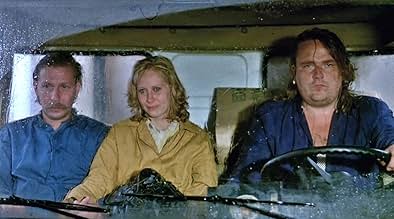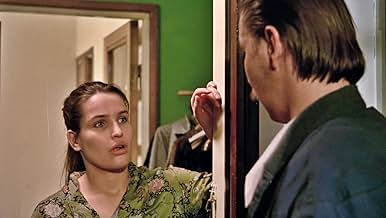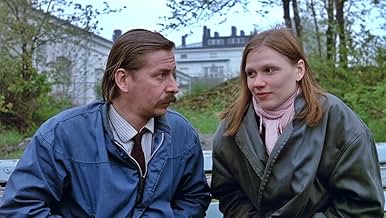CALIFICACIÓN DE IMDb
7.4/10
8.1 k
TU CALIFICACIÓN
Un episodio en la vida de Nikander, implicado en la muerte de un compañero de trabajo, una aventura amorosa y mucho más.Un episodio en la vida de Nikander, implicado en la muerte de un compañero de trabajo, una aventura amorosa y mucho más.Un episodio en la vida de Nikander, implicado en la muerte de un compañero de trabajo, una aventura amorosa y mucho más.
- Premios
- 1 premio ganado en total
Safka Pekkonen
- Pianist
- (as Safka)
Mato Valtonen
- Pelle
- (as Markku Valtonen)
Sakke Järvenpää
- Staffan
- (as Sakari Järvenpää)
- Dirección
- Guionista
- Todo el elenco y el equipo
- Producción, taquilla y más en IMDbPro
Opiniones destacadas
Various visuals in "Shadows in Paradise" manage to speak more than thousands of words. In the spirit of "L'Atalante" and "Marty", "Shadows in Paradise" is a poignant love story that chronicles two likable characters' miraculous, romantic, and conflict-infested relationship. It combines the hilarious with the melancholic in a way that director Aki Kaurismäki had proved to master time and time again. His juggling of emotions is bathed in stark realism that lies within the film's colorful visuals.
The lead characters are not played by glamorous Hollywood stars, these characters are not the stereotypical fools usually present in romantic comedies. They are real, but still quite interesting, human beings. In the spirit of writers like James Joyce and filmmakers such as Charles Burnett, Kaurismaki finds beauty in everyday moments and people. While there are moments of fierce conflict in this film that can, in no way, be called "mundane", a vast majority of what occurs in "Shadows in Paradise" is highly normal and borderline bland. However, through these slight details, Kaurismaki is able to explore the depths of the human experience, as well as the hidden beauty within the everyman. This sweet, gentle, and darkly comic love story will impress both romantics and film critics.
The lead characters are not played by glamorous Hollywood stars, these characters are not the stereotypical fools usually present in romantic comedies. They are real, but still quite interesting, human beings. In the spirit of writers like James Joyce and filmmakers such as Charles Burnett, Kaurismaki finds beauty in everyday moments and people. While there are moments of fierce conflict in this film that can, in no way, be called "mundane", a vast majority of what occurs in "Shadows in Paradise" is highly normal and borderline bland. However, through these slight details, Kaurismaki is able to explore the depths of the human experience, as well as the hidden beauty within the everyman. This sweet, gentle, and darkly comic love story will impress both romantics and film critics.
After a stunning debut, Crime and Punishment, and a bizarre, experimental second feature, Calamari Union, Aki Kaurismäki began doing what he's best at: telling the stories of Finnish underdogs'everyday experiences. And it all started with Shadows in Paradise, the first installment of the "workers trilogy" (continued with Ariel and The Match Factory Girl), and arguably Kaurismäki's finest film (at least until he made The Man Without a Past). It also marked his first collaboration with Kati Outinen, who has become the very symbol, alongside the late Matti Pellonpää, of Kaurismäki's cinema.
Fittingly, Pellonpää and Outinen are the leading couple of shadows in Paradise. He reprises the role of Nikander he previously played in Crime and Punishment, with more English lessons (which originate his best line, at the end of the film) and trouble at work: his plans to start his own business get buried with his associate (Esko Nikkari), who commits suicide five minutes into the movie. While looking for a new job, he meets Ilona (Outinen), who works as a cashier in a Helsinki supermarket. The two start hanging out, eventually forming a sweet, if platonic, bond, occasionally threatened by Nikander's apparent cynicism.
The film's magic resides entirely in its minimalism: little dialogue, sober settings, raw, Finnish humor, real, likable characters and no overacting, as Kaurismäki tells his simple, universal, incredibly touching love story. Pellonpää and Outinen's understated, affecting performances complete each other, with valuable support from Sakari Kuosmanen as Melartin, Nikander's best friend, who even steals from his own daughter to finance his buddy's dates. Not that his behavior is exemplary, but it shows how much these people care for each other, and that's where Kaurismäki succeeds: he makes us emphasize with these characters despite their many flaws, and delivers an astounding, memorable picture.
A true masterpiece of Finnish film-making, from the best director that country has ever spawned.
Fittingly, Pellonpää and Outinen are the leading couple of shadows in Paradise. He reprises the role of Nikander he previously played in Crime and Punishment, with more English lessons (which originate his best line, at the end of the film) and trouble at work: his plans to start his own business get buried with his associate (Esko Nikkari), who commits suicide five minutes into the movie. While looking for a new job, he meets Ilona (Outinen), who works as a cashier in a Helsinki supermarket. The two start hanging out, eventually forming a sweet, if platonic, bond, occasionally threatened by Nikander's apparent cynicism.
The film's magic resides entirely in its minimalism: little dialogue, sober settings, raw, Finnish humor, real, likable characters and no overacting, as Kaurismäki tells his simple, universal, incredibly touching love story. Pellonpää and Outinen's understated, affecting performances complete each other, with valuable support from Sakari Kuosmanen as Melartin, Nikander's best friend, who even steals from his own daughter to finance his buddy's dates. Not that his behavior is exemplary, but it shows how much these people care for each other, and that's where Kaurismäki succeeds: he makes us emphasize with these characters despite their many flaws, and delivers an astounding, memorable picture.
A true masterpiece of Finnish film-making, from the best director that country has ever spawned.
Released in 1986, Aki Kaurismaki's VARJOJA PARATIISISSA (Shadows in Paradise) is one of the Finnish filmmaker's earliest efforts, and it stands as one of the most idiosyncratic romantic comedies of all time. The painfully shy Nikander (Matti Pellonpää), a garbage man, means the moody Ilona, a supermarket checkout girl. The film tracks their bumbling attempt to establish a lasting relationship: dates that end as soon as they've begun, a romantic getaway where they each retreat to separate hotel rooms, and rare conversations which employ the absolute bare minimum of words. Nikander's best and only friend Melartin (Sakari Kuosmanen), whom the garbage man only recently met through a spell in jail, gives some needed encouragement.
The film's soundtrack is rooted in early rock-and-roll, though unlike later Kaurismaki films where the characters seem to be living in a 1950s bubble, all the action takes place in contemporary Helsinki. I've criticized Kaurismaki's vision of Finland in other films, but VARJOJA PARATIISISSA does, in my opinion, accurately depict the collection of gloomy, taciturn binge drinkers that are the Finns.
VARJOJA PARATIISISSA is an early work and doesn't show the confidence of later efforts, but it's still quite entertaining, its leads and their struggles extremely charming, and I would recommend the film. Certainly the performances of Pellonpää (in a typical Pellonpää role) and Outinen (who seemingly reinvents herself in every film) will prove quite memorable.
The film's soundtrack is rooted in early rock-and-roll, though unlike later Kaurismaki films where the characters seem to be living in a 1950s bubble, all the action takes place in contemporary Helsinki. I've criticized Kaurismaki's vision of Finland in other films, but VARJOJA PARATIISISSA does, in my opinion, accurately depict the collection of gloomy, taciturn binge drinkers that are the Finns.
VARJOJA PARATIISISSA is an early work and doesn't show the confidence of later efforts, but it's still quite entertaining, its leads and their struggles extremely charming, and I would recommend the film. Certainly the performances of Pellonpää (in a typical Pellonpää role) and Outinen (who seemingly reinvents herself in every film) will prove quite memorable.
The first part of AKI's "worker" trilogy is also the first time to see his works. It basically meets the expectations. The shooting is not artificial. It completely and truly restores the face of the bottom society in Finland and the various problems that men have to face in their life. In some places, people's loneliness is well interpreted, which is worthy of the word "lonely shadow" in the title. The director himself is also very handsome. He is not an ordinary actor at first sight. He looks forward to his future works.
A simpleminded garbage man and a misanthropic supermarket checkout girl find the road to romance paved with ennui in yet another of Aki Kaurismäki's patented minimal mini-dramas. The prolific Finnish director pares down the love story to its most basic components: a man, a woman, and a mood of urban alienation shaded in tones of European gray. The film is entirely negligible, but that's (presumably) all part of its charm, and what passes for a plot is merely an excuse for Kaurismäki's deadpan comic ironies. It's easy to watch and even easier to ignore, looking like a rough sketch for a minor work by a filmmaker poised for bigger things.
¿Sabías que…?
- TriviaTowards the end, there's a scene where Nikander's friend talks about a problematic fellow worker named Mikkonen. Matti Pellonpää, who plays Nikander here, would later play Mikkonen in Ariel (1988), the second part of the Proletariat trilogy directed by Aki Kaurismäki.
- ErroresWhen Nikander and Ilona leave the gas station and ride down the road, they pass a white car. The white car is standing still in the middle of the road. Presumably they drove so fast that they passed the white car, but it stands still.
- ConexionesFeatured in Century of Cinema: Scandinavie, Stig Björkman (1995)
- Bandas sonorasHerbstlaub
Written by Klaus Treuheit
Performed by Klaus Treuheit
Selecciones populares
Inicia sesión para calificar y agrega a la lista de videos para obtener recomendaciones personalizadas
Detalles
Taquilla
- Total a nivel mundial
- USD 298
- Tiempo de ejecución
- 1h 14min(74 min)
- Mezcla de sonido
- Relación de aspecto
- 1.85 : 1
Contribuir a esta página
Sugiere una edición o agrega el contenido que falta


























